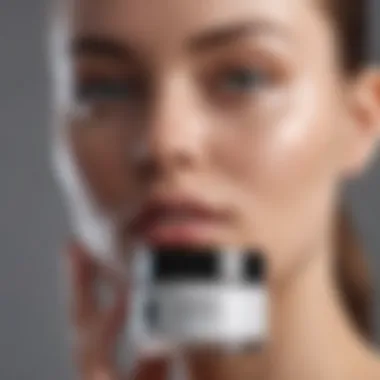Discover the Best Acne Products to Achieve Clearer Skin


Product Reviews
Top Cleansers for Acne-Prone Skin
When it comes to battling acne, using the right cleanser is paramount. Look for gentle yet effective formulas containing salicylic acid or benzoyl peroxide. These ingredients help unclog pores and reduce acne-causing bacteria, promoting clearer skin. Popular options include [Brand X Cleanser], known for its deep-cleansing properties without stripping the skin's natural moisture.
Targeted Spot Treatments
Combat stubborn acne spots with targeted treatments designed to reduce inflammation and promote healing. Products containing sulfur or tea tree oil are effective in drying out blemishes and calming redness. [Brand Y Spot Treatment] is a go-to choice for many, thanks to its potent formula that swiftly targets and diminishes acne spots.
Nourishing Serums
Integrating a nourishing serum into your skincare routine can help repair skin damage from acne and boost overall skin health. Look for serums with ingredients like niacinamide or hyaluronic acid, known for their hydrating and skin-soothing properties. [Brand Z Serum] is highly praised for its lightweight texture and ability to improve skin texture and tone.
Hydrating Moisturizers
Even oily, acne-prone skin needs hydration to maintain its balance. Opt for oil-free, non-comedogenic moisturizers that provide adequate hydration without clogging pores. [Brand W Moisturizer] is a favorite among those with acne concerns for its hydrating capabilities without exacerbating breakouts.
Understanding Acne
Causes of Acne
Hormonal Imbalance: Hormonal imbalance plays a significant role in acne formation, particularly in adolescents and women. Fluctuations in hormone levels can trigger the overproduction of sebum, leading to clogged pores and subsequent breakouts. Addressing hormonal imbalance is vital in acne management to restore skin balance and reduce the incidence of blemishes.
Excess Sebum Production: Excessive sebum production is a common factor in acne-prone skin. Sebum, an oily substance produced by the skin's sebaceous glands, can clog pores when produced in excess. This can fuel the growth of acne-causing bacteria and promote inflammation, resulting in various forms of acne lesions.
Clogged Pores: Clogged pores, often due to a combination of sebum, dead skin cells, and bacteria, are key contributors to acne development. When pores become blocked, the skin's natural processes are disrupted, leading to the formation of whiteheads, blackheads, and other acne lesions. Prevention of pore blockage is crucial in maintaining clear and healthy skin.
Types of Acne
Whiteheads: Whiteheads, or closed comedones, are characterized by small, white bumps on the skin's surface. These form when pores become blocked by a combination of sebum and dead skin cells. Proper cleansing and exfoliation are essential in addressing whiteheads and preventing their recurrence.
Blackheads: Blackheads, or open comedones, are similar to whiteheads but have a wider opening exposed to air, giving them a dark appearance. Blackheads are caused by the oxidation of sebum and debris within pores. Gentle exfoliation and pore-clearing products can help manage blackheads effectively.
Pustules: Pustules are inflamed acne lesions filled with pus, causing redness and tenderness. These lesions result from bacterial infection and inflammation within blocked pores. Targeted spot treatments and antibacterial agents can help reduce pustule size and prevent scarring.
Cysts: Cysts are deep, painful acne nodules that develop beneath the skin. These severe lesions can cause scarring and long-lasting skin damage if not treated promptly. Professional interventions and proper skincare regimens are vital in managing cystic acne.
Impact of Acne on Skin Health
Inflammation: Inflammation is a common skin response to acne lesions, leading to redness, swelling, and discomfort. Chronic inflammation can exacerbate acne symptoms and contribute to skin scarring. Anti-inflammatory skincare ingredients and treatments are beneficial in calming acne-related inflammation.
Scarring: Acne scarring is a persistent reminder of past breakouts, affecting skin texture and appearance. Different types of acne scars, such as atrophic and hypertrophic scars, can form depending on the severity of the acne lesions. Scar-reducing treatments and procedures can help improve skin texture and promote healing.
Psychological Effects: The psychological impact of acne extends beyond physical symptoms, affecting self-esteem and quality of life. Individuals with acne may experience anxiety, depression, and social withdrawal due to their skin condition. Psychological support, self-care practices, and effective acne management can alleviate emotional distress and improve overall well-being.
Essential Products for Acne-Prone Skin


In this article, delving into the section of essential products for acne-prone skin becomes paramount. Acne, a persistent skin concern affecting many individuals, necessitates a thoughtful approach towards skincare routines. The selection of products designed specifically for acne-prone skin plays a pivotal role in managing and alleviating this condition. Understanding the importance of choosing suitable cleansers, spot treatments, serums, moisturizers, and sunscreens tailored for acne-prone skin is crucial in fostering skin health and combating breakouts efficiently.
Cleansers
Salicylic Acid Cleansers
Salicylic Acid Cleansers constitute a foundational component in acne skincare due to their exceptional ability to penetrate pores deeply. These cleansers are renowned for their exfoliating properties, effectively removing dead skin cells, excess oil, and debris that contribute to acne formation. Salicylic Acid, a beta-hydroxy acid, offers anti-inflammatory and antibacterial benefits, making it a preferred choice for managing acne-prone skin. However, it's essential to note that prolonged usage can lead to dryness or irritation, necessitating cautious application and monitoring.
Gentle Hydrating Cleansers
Contrary to the common assumption that acne-prone skin should only use drying agents, gentle hydrating cleansers can offer a balancing effect. These cleansers are formulated to cleanse the skin delicately without stripping it of essential moisture. Incorporating gentle hydrating cleansers into a skincare routine can help maintain the skin's natural barrier, preventing excessive dryness and irritation often associated with acne treatments.
Sulfur-based Cleansers
Sulfur-based cleansers present a unique approach to acne treatment by leveraging the antibacterial and anti-inflammatory properties of sulfur. These cleansers work to reduce excess oil production, unclog pores, and combat acne-causing bacteria. Sulfur-based cleansers are particularly beneficial for individuals with sensitive skin, as they tend to be gentler compared to other acne-fighting ingredients. However, some users may experience a temporary odor or skin discoloration, necessitating proper usage instructions and patch testing.
Spot Treatments
Benzoyl Peroxide Gels
Benzoyl Peroxide Gels stand out as a staple in spot treatments for acne due to their potent antibacterial properties. These gels target existing blemishes by eliminating acne-causing bacteria while preventing future breakouts. Benzoyl Peroxide also aids in reducing inflammation and unclogging pores, leading to clearer skin over time. It's essential to use benzoyl peroxide gels judiciously to prevent excessive drying or irritation, ensuring optimal results.
Tea Tree Oil Spot Treatments
Tea Tree Oil Spot Treatments offer a natural approach to acne treatment, harnessing the antimicrobial and anti-inflammatory properties of tea tree oil. These treatments work effectively in reducing redness, swelling, and inflammation associated with acne lesions. Tea tree oil's gentle nature makes it a suitable option for individuals with sensitive skin, providing a soothing alternative to traditional acne treatments. However, it's crucial to note potential allergic reactions or skin sensitivities, emphasizing patch testing before widespread application.
Sulfur Masks
Sulfur Masks serve as intensive treatments for stubborn acne concerns, delivering targeted benefits to troubled areas. These masks leverage sulfur's drying and antibacterial properties to combat acne breakouts effectively. Sulfur masks are highly effective in absorbing excess oil, reducing inflammation, and promoting clearer skin over time. Despite their efficacy, some users may find the characteristic sulfur smell off-putting, requiring consideration of personal preferences and tolerance levels.
Serums and Treatments
Retinol Serums
Retinol Serums emerge as potent formulations in combating acne and promoting skin renewal. Retinol, a derivative of vitamin A, accelerates cell turnover, unclogs pores, and reduces post-inflammatory hyperpigmentation commonly seen in acne-prone skin. Incorporating retinol serums into a skincare regimen can result in smoother, clearer skin with continued use. However, retinol may cause initial dryness or sensitivity, highlighting the need for gradual introduction and consistent sun protection.
Niacinamide Treatments
Niacinamide Treatments offer a multifaceted approach to addressing acne concerns, thanks to their anti-inflammatory and sebum-regulating properties. Niacinamide, a form of vitamin B3, works to strengthen the skin's barrier, reduce redness, and control oil production, leading to improved skin texture and tone. Incorporating niacinamide treatments into a skincare routine can help alleviate acne symptoms without causing excessive dryness or irritation, making them suitable for various skin types.
Vitamin Serums
Vitamin C Serums present a rejuvenating option for individuals battling acne, offering antioxidant protection and brightening effects. Vitamin C's ability to neutralize free radicals, stimulate collagen production, and fade acne-related discoloration makes it a valuable addition to an acne skincare regimen. Regular use of vitamin C serums can promote a more even skin tone, enhanced brightness, and improved skin resilience. However, individuals with sensitive skin should exercise caution and perform a patch test due to vitamin C's potency.
Moisturizers and Sunscreens
Oil-free Moisturizers


Oil-free Moisturizers cater to the needs of acne-prone skin by providing essential hydration without clogging pores or exacerbating breakouts. These moisturizers are formulated to be lightweight, non-comedogenic, and fast-absorbing, making them ideal for oily or combination skin types. Incorporating an oil-free moisturizer into a skincare routine can help balance moisture levels, prevent dryness, and create a smooth base for makeup application. However, selecting a suitable oil-free moisturizer tailored to individual skin concerns is crucial for optimal results.
Non-Comedogenic Formulas
Non-Comedogenic Formulas offer a non-pore-blocking solution for individuals seeking effective moisturization without the risk of acne flares. These formulas are designed to be hypoallergenic and free of common pore-clogging ingredients, making them suitable for acne-prone and sensitive skin types. Opting for non-comedogenic formulas can help maintain skin clarity, reduce the likelihood of breakouts, and support overall skin health. However, it's essential to choose non-comedogenic formulas compatible with specific skin needs and preferences to achieve the desired outcomes.
Broad-Spectrum Sunscreens
Broad-Spectrum Sunscreens play a vital role in protecting acne-prone skin from the harmful effects of sun exposure and UV damage. These sunscreens offer comprehensive protection against both UVA and UVB rays, helping prevent premature aging, hyperpigmentation, and exacerbation of acne scars. Incorporating a broad-spectrum sunscreen into a daily skincare routine is imperative for maintaining skin health, preventing sun damage, and supporting long-term skin rejuvenation. Selecting a broad-spectrum sunscreen with lightweight, non-greasy formulations is essential for comfortable wear and consistent sun protection.
Specialized Acne Solutions
Specialized Acne Solutions play a pivotal role in addressing challenging acne concerns effectively, focusing on tailored treatments that target specific skin issues. In this part of the article, we delve into specialized solutions that go beyond conventional products, offering advanced choices for individuals dealing with persistent acne problems. By exploring specialized acne solutions, readers can gain valuable insights into alternative approaches that may suit their unique skin requirements, providing a more comprehensive treatment regimen.
Prescription Treatments
Topical Retinoids:
Topical Retinoids stand out as a cornerstone in the realm of prescription acne treatments, known for their potent ability to unclog pores, reduce inflammation, and promote cell turnover. The key characteristic of Topical Retinoids lies in their effectiveness in targeting acne at its core, addressing both current breakouts and preventing future ones. Their unique feature includes accelerating skin renewal, leading to smoother texture and diminished acne scars. While Topical Retinoids work wonders for many, some users may experience temporary skin dryness or increased sensitivity, requiring gradual integration into the skincare routine for optimal results.
Oral Antibiotics:
Oral Antibiotics offer a systemic approach to combating acne, particularly in cases where topical treatments prove insufficient. The primary characteristic of oral antibiotics is their ability to reduce acne-causing bacteria and inflammation internally, providing a more holistic solution to severe acne. This choice proves beneficial for individuals with widespread acne or those unresponsive to topical therapies. While effective, oral antibiotics may pose a risk of antibiotic resistance and digestive issues in some cases, necessitating careful monitoring and guidance from healthcare professionals.
Hormonal Therapy:
Hormonal Therapy addresses acne rooted in hormonal fluctuations, making it a go-to option for individuals with hormonal acne or those whose breakouts coincide with menstrual cycles. The key characteristic of hormonal therapy lies in regulating hormone levels to mitigate acne triggers, offering enduring relief for persistent hormonal acne. Its unique feature includes balancing hormones to reduce sebum production and prevent comedones, actively tackling the root cause of hormonal breakouts. While hormonal therapy is highly effective for hormonal acne, it may require ongoing monitoring for side effects and adjustments to optimize results.
Natural Remedies
Aloe Vera:
Aloe Vera emerges as a soothing and anti-inflammatory natural remedy for acne, known for its gentle yet effective healing properties. The key characteristic of Aloe Vera is its capacity to calm irritated skin, reduce redness and swelling associated with acne, making it a popular choice for sensitive skin types. Its unique feature includes hydrating the skin without clogging pores, offering a natural alternative for soothing acne-prone skin. While Aloe Vera is well-tolerated by most individuals, it may cause allergic reactions in some, highlighting the importance of patch testing before extensive use.
Green Tea Extract:
Green Tea Extract exudes antioxidant and anti-inflammatory properties, making it a promising natural remedy for acne management. The key characteristic of Green Tea Extract lies in its ability to reduce sebum production, fight acne-causing bacteria, and soothe inflamed skin, presenting a holistic approach to address various acne concerns. Its unique feature includes promoting cell regeneration and protecting the skin from environmental stressors, aiding in overall skin health. While Green Tea Extract is generally safe for topical application, individuals with caffeine sensitivities should exercise caution to avoid any adverse reactions.
Zinc Supplements:
Zinc Supplements stand out for their role in regulating oil production, promoting skin healing, and bolstering the immune system, making them a valuable addition to acne treatment regimens. The key characteristic of Zinc Supplements is their capacity to reduce inflammation, prevent acne scarring, and support skin renewal, offering comprehensive support for acne-prone skin. Their unique feature includes enhancing collagen synthesis and tissue repair, aiding in faster recovery from breakouts. While Zinc Supplements are generally well-tolerated, excessive intake may lead to digestive issues, emphasizing the importance of moderation and personalized dosages.
Professional Treatments
Chemical Peels:
Chemical Peels offer a professional exfoliation technique that targets acne, acne scars, and uneven skin tone, delivering visible improvements in skin texture and clarity. The key characteristic of Chemical Peels is their ability to remove dead skin cells, unclog pores, and stimulate collagen production, revealing smoother and radiant skin. Their unique feature includes customizable formulations to suit different skin concerns, ranging from mild to deep peels for varying degrees of skin resurfacing. While Chemical Peels offer transformative results, they may entail downtime and post-treatment care, necessitating adherence to skincare protocols for optimal outcomes.


Microdermabrasion:
Microdermabrasion serves as a non-invasive procedure that exfoliates the skin, diminishes acne scars, and improves overall skin texture, making it a popular choice for acne-prone individuals seeking skin rejuvenation. The key characteristic of Microdermabrasion lies in its mechanical exfoliation technique that buffs away dead skin cells, promotes collagen production, and enhances product absorption, resulting in smoother and rejuvenated skin. Its unique feature includes minimal downtime and suitability for all skin types, offering a gentle yet effective solution for acne-related skin concerns. While Microdermabrasion is generally safe, individuals with sensitive skin or active acne lesions should consult with skincare professionals for personalized recommendations.
Laser Therapy:
Laser Therapy stands at the forefront of professional acne treatments, harnessing light energy to target acne-causing bacteria, reduce inflammation, and minimize sebum production, resulting in clearer and healthier skin. The key characteristic of Laser Therapy is its precision in targeting specific skin concerns, tailoring treatments to individual acne types and severity levels for optimal results. Its unique feature includes stimulating collagen synthesis, evening out skin tone, and diminishing acne scars, offering comprehensive rejuvenation for acne-prone skin. While Laser Therapy presents significant improvements in acne management, multiple sessions may be necessary for sustained outcomes, necessitating collaboration with experienced dermatologists for personalized treatment plans.
Choosing the Right Products
Choosing the right products is a critical aspect when dealing with acne. Finding the most suitable products can significantly impact the effectiveness of your skincare routine. It is essential to consider factors such as your skin type, specific concerns, and any sensitivities you may have. By selecting products tailored to your needs, you can optimize results and minimize potential adverse reactions. Investing time in research and understanding the ingredients in your products can lead to better outcomes and overall skin health.
Skin Type Considerations
Oily Skin
Oily skin is characterized by excess sebum production, often leading to a shiny complexion and enlarged pores. While this skin type is more prone to acne breakouts, it also has the advantage of maintaining moisture levels better than dry skin. Opting for products that help control oil production without stripping the skin's natural barriers can benefit those with oily skin.
Dry Skin
Dry skin lacks proper hydration, often feeling tight and flaky. Despite being less prone to acne, dry skin requires gentle yet nourishing products to prevent further moisture loss and maintain skin health. Choosing hydrating ingredients such as hyaluronic acid and ceramides can help restore and strengthen the skin barrier.
Combination Skin
Combination skin presents a mix of both oily and dry areas on the face. This skin type requires a balanced approach, using products that address specific concerns in different areas. Choosing lightweight, non-comedogenic formulas can help regulate oil production in the T-zone while providing adequate hydration to drier areas.
Ingredient Preferences
Avoiding Harsh Chemicals
Avoiding harsh chemicals, such as sulfates and parabens, can benefit acne-prone skin by preventing irritation and inflammation. Opting for gentle, non-abrasive ingredients can reduce the risk of exacerbating existing breakouts and sensitivities.
Preferring Non-Comedogenic Ingredients
Non-comedogenic ingredients are essential for acne-prone skin as they do not clog pores or contribute to further breakouts. Prioritizing lightweight and oil-free formulations can help maintain clear pores and prevent acne formation.
Seeking Soothing Agents
Soothing agents like aloe vera and chamomile can help calm inflammation and redness associated with acne. Incorporating products with anti-inflammatory properties can promote healing and enhance skin comfort during acne flare-ups.
Consulting with Dermatologists
Professional Skin Analysis
Professional skin analysis provides an in-depth evaluation of your skin's condition, identifying specific concerns and characteristics that require attention. Dermatologists can offer personalized recommendations based on your skin type, concerns, and medical history, enabling targeted treatment plans.
Personalized Treatment Plans
Personalized treatment plans are customized regimens developed by dermatologists to address individual skin concerns effectively. These plans may include prescription medications, targeted skincare products, and in-office treatments to manage acne and improve overall skin health.
Monitoring Progress
Monitoring progress is crucial in tracking the effectiveness of your skincare routine and treatment plan. Regular follow-ups with your dermatologist allow for adjustments to be made, ensuring optimal results and addressing any emerging issues promptly.



